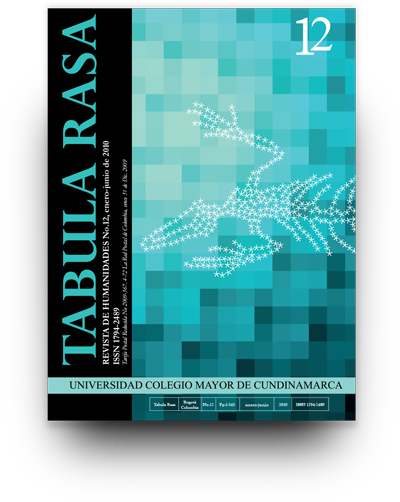On modest witnesses and zero-points of observation: the uncomfortable intersections between science and coloniality
De testigos modestos y puntos cero de observación: las incomodas intersecciones entre la ciencia y la colonialidad
Show authors biography
This work aims to problematize the relationship between science and coloniality by following two traditions of contemporary critical thought. Having this goal in mind, some of the central debates in Feminist Studies of Science and postcolonial Latin-American theory are discussed, particularly the proposals that have been developed in the Modernity / Coloniality Program in Latin-America. Besides presenting a dialogue between these two frameworks of thought, some of the implications are discussed, opening directions for thinking further about contemporary forms of production of knowledge.
Article visits 218 | PDF visits 123
Downloads
Adan, Carme. 2006. Feminismo y conocimiento. Galicia: Spiralia Ensayo.
Barrientos, Joaquín. 2009. Apetitos Extremos: La colonialidad del ver y las imágenes-archivo sobre el canibalismo de Indias. Trabajo presentado en el Seminario: La Colonialidad del Ver. Quito: Universidad Andina Simón Bolívar.
Castro-Gómez, Santiago. 2005. La Hybris del punto cero. Ciencia, raza e ilustración en la Nueva Granada (1750-1816). Bogotá: Editorial Pontificia Universidad Javeriana.
Dussel, Enrique. 1992. 1492: El encubrimiento del otro. El origen del mito de la modernidad.
Conferencias de Frankfort 1992. Bogotá: Anthropos Dussel, Enrique. 1999. «Más allá del eurocentrismo: El Sistema - Mundo y los límites de la modernidad». En: Castro-Gómez S, Guardiola O y Millan de Benavides Carmen (eds).
Pensar (en) los intersticios. Teoría y práctica de la crítica poscolonial. Bogotá: CEJA.
Escobar, Arturo. 2003. «Mundos y conocimientos de otro modo. El programa de investigación Modernidad/Colonialidad Latinoamericano». Tabula Rasa, 1:51-86.
Foucault, Michel.1966 [1997]. Las palabras y las cosas: una arqueología de las ciencias humanas, México DF: Siglo XXI.
Foucault, Michel. 1974 [1978]. La verdad y las formas jurídicas. Barcelona: Gedisa.
Fox Keller, Evelyn. 1985 [1991]. Reflexiones sobre género y ciencia. Valencia: Alfons el Magnanim.
Haraway, Donna. 1997 [2004]. Testigo_Modesto@ Segundo_Milenio. HombreHembra©_Conoce_ Oncorratón®: Feminismo y tecnociencia. Barcelona: UOC. Colección Nuevas Tecnologías y Sociedad.
Harding, Sandra. 1986 [1996]. Ciencia y feminismo. Madrid: Morata.
Harding, Sandra. 1998. Is science multicultural? Postcolonialism, feminism, and epistemologies. U.S.A.: Indiana University Press.
Harding, Sandra. 2006. Science and social inequality: feminist and postcolonial issues. Urbana : University of Illinois Press.
Heidegger, Martin. 1938 [1996]. «La época de la imagen de mundo». En: Caminos de bosque. Madrid: Alianza.
Kant, Immanuel. 1784 [2004]. ¿Qué es la Ilustración? Y otros escritos de ética, política y filosofía de la historia. Madrid: Alianza.
King, Geoff. 1996. Mapping reality: An exploration of cultural cartographies. London: Macmillan.
Mignolo, Walter. 1995 [1999]. The Darker Side of Renaissance: Literacy, Territoriality & Colonization. Durham: Duke University Press.
Mignolo, Walter. 1999. “I am where I think: Epistemology and the colonial difference”. Journal of Latin American Cultural Studies (13569325), 8(2):235.
Mignolo, Walter. 2000 [2003]. Historias locales/ diseños globales. Colonialidad, conocimientos subalternos y pensamiento fronterizo. Madrid: Akal.
Pickles, John. 2004. A History of Spaces. Cartographic Reason, Mapping and the Geo-coded World. NY: Routledge
Potter, Elizabeth. 1988. “Modeling the gender politics in science”. Hypatia, 3(1):19.
Quijano, Anibal. 2000 [2007]. «Colonialidad del poder y clasificación social». En: CastroGómez, S y Grosfoguel, R. (eds). El giro decolonial. Bogotá: Siglo del hombre editores.
Said, Edward. 1978 [2002]. Orientalismo. Madrid: Debate S.A.
Sargent, Rose. 2004. “Robert Boyle and the masculine methods of science”. Philosophy of Science, 71(5):857-867.
Schiebinger, Londa. 2004. “Feminist history of colonial science”. Hypatia, 19(1):233-254.
Shapin, Steven y Simon Schaffer. 1985. Leviathan and the Air pump. Hobbes, Boyle and the Experimental Life. N.J.: Princeton University Press.
Shapin, Steven. 1994. A Social History of Truth. Civility and Science in Seventeen-Century England. Chicago: The University of Chicago Press.
Shapin, Steven. 1996 [2000]. La Revolución Científica. Una interpretación alternativa. Barcelona: Paidós Studio




